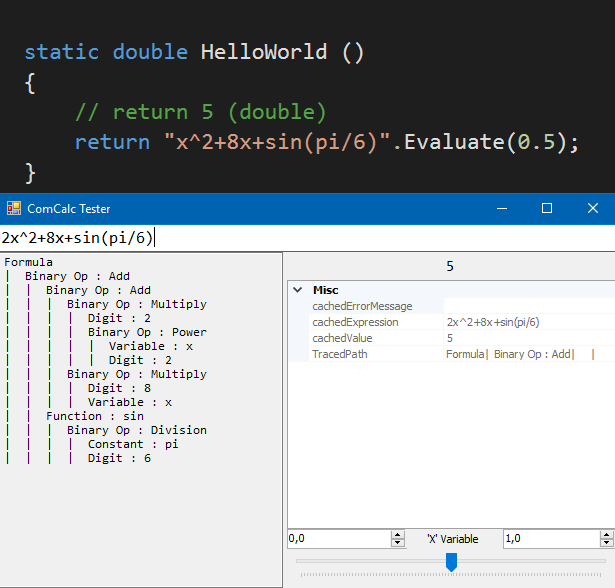ComCalc
A General .NET Mathematical Evaluator from String

ComCalc is a .NET API build to generally evaluate a math expression from strings. In a nutshell, it can do ....
// Returns 15 (double)
Console.WriteLine( "5+4^2-!3".Evaluate() );
// Note: Evaluate() function don't exist in .NET, it is basically an extension from ComCalc APIMain Features
This API doesn't just do basic math operations. ComCalc can handle :
- Binary operators
addition (+),multiplication (*),exponentials (^),booleans (|) (&), etc. - Unary operators
negation (-),inversion (~),factorial (!), etc. - Functions
sqrt(),abs(),sign(),sin(),cos(),tan(),log(),exp(), etc. - Multi-parametered Functions
min(,,,),max(,,,), etc. - Constants
pi,2pi,e,true,false, etc.
ComCalc also are designed to make it possible to be reusable over a long run. Just keep to scroll down ... *PS: * complete operation list is on ComLibrary.cs
How it works
ComCalc divide the works into two process. The first thing that they do is by translating the string (aka. parsing) into branch of classes, and then compute it into a double number. This API doesn't just turn the string into double, but also can show the hierarchy of what they do behind the scene. Like:
// Returns nodes (path of which have to calculated first) in form of string, and pop it into console
Console.WriteLine( "5+4^2-!3".ParseExpression().TracedPath );... and this is what the console output looks like ...
Formula
| Binary Op : Add
| | Digit : 5
| | Binary Op : Subtract
| | | Binary Op : Power
| | | | Digit : 4
| | | | Digit : 2
| | | Unary Op : Factorial
| | | | Digit : 3
Installation
Simply put the scripts into your project and you're ready to go!. If you need to use it, don't forget this main step ...
// Put this onto topmost of your script files
// This will make things like Evaluate() can show up in intellisense
using ComCalcLib;The Library
Without Library, there's nothing to type in ComCalc. If you take a look at ComCalcLib\ComLibrary.cs there's a bunch of function that you are absolutely welcome to edit into what your project need. To make the Library implementation easy, we use Reflection and Attributes. These powerful C# feature are used so you can, for example, adding more kind of operator or functions.
public class DefaultComLibrary
{
// To create a binary/unary operator (state it in attribute),
// simply add ComOperator and choose the char in the attribute
// (have to be non-alphanumeric), and it's level-of-importance
// Binary must have two arguments, while Unary just have only one
[ComOperator('+', 1)]
public static double Add(double a, double b)
{
return a + b;
}
//Functions, Multi-Functions, Constant is simple, there's none
//Args in the attribute needed, except if want different name for the desired function
[ComFunction] public static double sqr(double v) { return v*v; }
[ComMultiFunction] public static double mult(List<double> v) { return v[0]*v[1]; }
[ComConstant] public static double e() { return v*v; }Remember that the function have to be public static to make it discoverable. Anyway, if you want to write it outside of this DefaultComLibrary instead, then do it anyway!, because at program initialization (or somewhere else), you can call ...
// Find and Load relevant libraries into ComCalcLib (globally) (this doesn't kill the old library)
ComHelper.LoadLibrary(typeof(YourClass));PS: If there's some duplicates found over different Library, then it'll just be overwrited with newer library.
Usage License
It's all covered in License section. Basically it is on MIT license, and you can modify, distribute, even use it for commercial things as long as you keep to credit author in your software binaries.
Feedback
This API is fairly new so everyone can make some feedback through issues page or direct mail
Have a look into our other projects